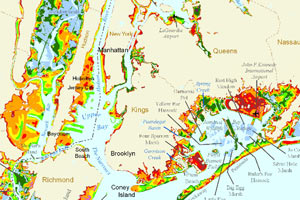
Matthew Knowles, the manager and father of the pop star Beyoncé, is not the kind of guy who needs a handout from Uncle Sam. His daughter and her husband, the rapper Jay-Z, are reportedly worth $265 million, his record company has sold 200 million albums, and his investments include an entire city block near downtown Houston. Even so, Knowles is in line for a lucrative taxpayer-backed bailout. A federally-funded disaster relief program is set to purchase his home in Galveston, Texas, which was rendered nearly worthless by damage from Hurricane Ike, for something close to its original value: A cool $425,000.
Knowles’ bailout is far from unique. In the name of disaster relief, the federal government routinely subsidizes some of the country’s wealthiest and most irresponsible property owners. In Texas alone this year, the Federal Emergency Management Agency is spending $100 million to buy and demolish more than 750 flood-prone buildings insured by the National Flood Insurance Program, many of them expensive waterfront homes. The land will be permanently set aside as open space.
FEMA argues that the buyout program will easily pay for itself. After all, the NFIP is already on the hook to repair many of the properties, most of which private insurers have long been too smart to cover. In 1993, FEMA realized that repairing similarly flood-prone homes along the Mississippi River was costing more than they were worth. Over the next eight years, a buyout program that targeted some of the swampiest properties achieved a 200 percent return on investment, FEMA says, preventing millions in insurance claims across the Midwest.
But along the Gulf Coast, FEMA’s buyouts make much less sense. Here’s the problem: FEMA is still insuring new homes that are all but certain to be underwater by the end of the century, submerged by a three-foot rise in sea level caused by climate change. Until FEMA starts accounting for climate change, its buyout program provides homeowners with a strong incentive to ignore the problem. Why worry about sea level rise when you know that, in the worst case scenario, the government will pick up the tab?
The situation is the screwiest in Texas, where FEMA is undermining the state’s own curbs on coastal development. As I explain in today’s Climate Desk piece, the Texas Open Beaches Act bans all homes on Texas beaches, even when the beach comes to the home, rather than vice versa. Knowles’ home, which ended up on the beach after Hurricane Ike eroded the coastline, would probably have been removed under the law. Texas’ hard-line approach to beach protection is also a low-cost way to force even the wealthiest property owners to plan for sea level rise. But it won’t work very well until FEMA stops using our tax money to pay people off.












